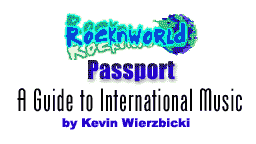
Minyeshu- Waves of Joy- Psoy Korolenko
![]()
Minyeshu - Daa Dee
Few world music albums caught as many ears last year as did this effort from Ethiopian singer Minyeshu. Using western instruments and contemporary arrangements, Minyeshu sings in Ethiopian throughout, and she's in a jazzy mood for "Aynocheh." "Hailo Gaja" features a lively groove and repetitive lyrics; you don't have to know that the song title translates to mean "Let's Dance" to want to move to the music. "Yeselam Ayer" has a distinctly African air to it as does "Yikerta," a cut once again geared to the dance floor. While Minyeshu's vocals shine all through the album, perhaps the best song to really appreciate her voice is the delicate title cut, "Daa Dee." But there are many stunners here including the rhythmic "Azawntua," the buoyant and horns-augmented "Enchet Lekema" and the slow and dreamy "Yachi Elet."
Waves of Joy - Field recordings by Deben Bhattacharya
Don't let the "field recordings" wording scare you away; these recordings were made in 2001 and they are sonically sound. The performances feature various artists from Shantiniketan, a small town in Western Bengal, India, singing traditional songs and playing instruments such as dotara, gungru, ektara, khamak, kartal and duggi. If the exotic sound of Indian pop music like heard in Bollywood films catches your ear, here you can hear that music's roots. Package includes a bonus DVD "Bauls from Bengal."
Psoy Korolenko - Yiddish Glory: The Lost Songs of World War II
There's a lengthy and amazing backstory that goes with the music presented here. To put it in a nutshell, recently-discovered song lyrics written by various non-musicians during World War II have been brought to life by a team of "musical archaeologists." Psoy Korolenko worked with hand-written notes (and a few available melodies) to conceptualize finished songs, composer Sergei Erdenko wrote arrangements for the songs, and producer Dan Rosenberg put together a band and singers to bring the cuts to fruition. So for scholars there's a lot to dig into here, and fans of world folk music can marvel at the fact that they can now, for the first time, hear songs written by amateurs who perished during the Holocaust. While many of the songs deal with dire subjects, there is not necessarily a darkness to the melodies; "Mayn Pulemnot (My Machine Gun)" is a bright Old World dance number and "Shelakhmones Hitlern (Purim Gifts for Hitler)" is upbeat and bouncy. Other songs do hang heavy with the expected sadness; "Mames Gruv (My Mother's Grave)," "Tayblis Briv (Taybi's Letter to her Husband at the Front)" and "Misha Tseraysts Hitler's Daytchland (Misha Tears Apart Hitler's Germany)" among the most emotional.
Share this article
![]()
On the Blue: New Horizons Cruise Days 4 & 5: Starship Lands on the Pearl, Alan Parsons Takes It Home
Kandace Springs - Run Your Race
On the Blue: New Horizons Cruise Day 1: Marbin Gets the Fun Started
Hot In The City: Prog Band Tu-Ner Coming to Phoenix
blink-182 Launching North American Stadium And Arena Tour
Watch David Gilmour's 'The Piper's Call' Video
Check Out Powerman 5000 'Dancing Like We're Dead'
The String Cheese Incident Take Fans On Epic 'Roll Around The Sun'
Watch Motley Crue's 'Dogs Of War' Video
Richie Sambora Returns With 'I Pray', The First Of Four New Songs
The Smashing Pumpkins Reveal New Guitarist
Linkin Park Top Hard Rock And Vinyl Albums Charts With Papercuts